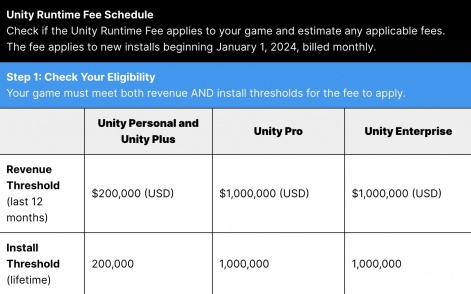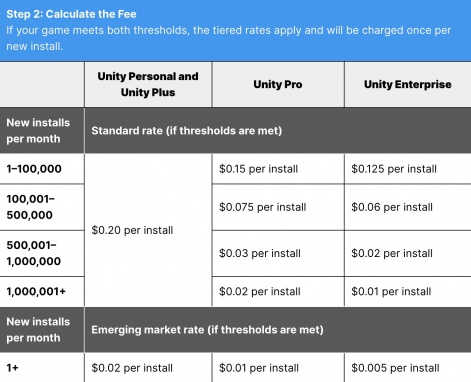It's pretty simple on paper. From January 1 2024 any game that is using the Unity Engine will be paying a fee to Unity for every install on a new device.
There’s a complex system of tiers and ways to mitigate the 20 cent ($0.20) fee per install but the long and the short of it is that this will be an earth-shaking upheaval to tens of thousands of developer’s monetisation plans.
The fee is called the Unity Runtime Fee and once a game has passed a revenue threshold in a year and a lifetime install count it has to start paying or cease to exist.
Those facts and figures in full
Unity Personal and Unity Plus users have a $200,000 revenue threshold a year and 200,000 free installs. Over that you start to pay with Unity Personal devs - aka the smallest and ‘poorest’ - being the hardest hit with 20 US cents per install.
Unity Pro and Unity Enterprise users have a $1 million a year revenue threshold and 1 million free installs. Over that, you start to pay with Unity Enterprise accounts paying the least at $0.01 for every install over two million.
Interestingly, wary of putting the boot in too hard and too fast, the fees are reduced for developers in emerging markets, with Unity Personal accounts paying $0.02 per install above the threshold and Enterprise accounts paying $0.005 per install.
Unity is also retiring its Unity Plus subscription and existing Plus subscribers can upgrade to Unity Pro for a year at the same price they paid for Plus. That's a generous offer - Pro for the same $400 per-year rate as Plus - sounds great. But after one year, they'll need to cough up the full $2,040 for the heftier plan.
It’s all rather complicated but whichever way you slice it Unity wants more money from devs and that amount is proportional to their game’s success. You’re making money? They want more of it.
Here are the fees:


Can they really do this?
It’s interesting to note that Unity considered a number of options before opting for their install-based fee. One such consideration was a profit share in which games made with Unity would have to continually cough-up cash as it was earned, effectively putting developers on the hook for paying Unity forever.
In their official statement Unity say “We believe that an initial install-based fee allows creators to keep the ongoing financial gains from player engagement, unlike a revenue share.”
So, Unity clearly feel that the situation for developers could have been worse and that at 20 cents per install they are, if not getting off lightly, then are at least paying their due to the tools and hard work that makes their apps possible.
It appears that Unity - in their pursuit for profit and perhaps with just a little jealousy of the sums of money being made from their work - may have gone in too hard, too fast.
However, it’s inevitable that many devs - and long-term Unity users - will feel differently. 20 cents up front feels like a hefty burden to appear overnight compared with a system that could seamlessly have paid fractional microtransactions.
Certainly it’s possible that in popular free-to-play markets - where many gamers simply never pay a fee - 20 cents upfront is money that the game’s creators can ill afford and will never get back. It’s easy to envisage that in less lucrative markets and countries many games are simply never released there.
Imagine notching up thousands (millions?) of downloads, racking up a healthy bill to Unity and then finding out your monetisation strategy wasn’t up to snuff? Can you afford to risk it?
Why are they doing this?
It appears that Unity - in their pursuit for profit and perhaps with just a little jealousy of the sums of money being made from their work - may have gone in too hard, too fast.
So why make the move and potentially make some people very unhappy? The company has traditionally struggled to make a profit, investing millions into their service with the promise of a payday around the corner.
Quarter four of 2022 was the first profitable (non-GAAP) quarter in the company's 18 year history and the figures from early August 2023 were record breaking. And with 40% of games being made using Unity in some way they clearly feel like they’ve turned a corner and with all the hard work and reputation building behind them, are now ready to accelerate into the distance.
And - potentially - the new fees could prove a great driver for their ads network post ironSource merger. If a dev goes all in with Unity’s ads system then their fee is reduced to just 1 cent rather than 20. So it seems daft not to, right?
And the platform itself just gets better. The initial drive behind yesterday’s reveal was to be the introduction of the platform’s generative AI tools. For example, all Unity plans will get Unity Sentis, which enables users to embed their new AI model in the Unity Runtime, inside your game or application and all “without needing to pay additional cloud-compute costs.”
There are other perks and improvements in terms of storage fees for Unity Asset Manager and Team Administration Tools.
It’s clear that Unity have worked long and hard on finding a sensible balance and doubtless these plans have been on the cards potentially for years. But that won’t change the fact that many devs have been caught by surprise and today will be reassessing their futures and their use of Unity going forwards.
We’ll keep tracking this story as it develops.






















